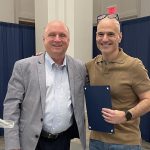Want to stay up to date with the latest conversations on peacebuilding, democracy, regional research, and more? Tune in to various podcasts offered through the Keough School’s institutes.
- Kellogg Institute for International Studies
Global Stage: Hear Kellogg doctoral student affiliates interview scholars about their research ranging from global threats to democracy to violence against women in India. Tune in to the Global Stage as they continue in their second season of conversations on cutting-edge research!
- Keough-Naughton Institute for Irish Studies
ARINS Podcast: Join host Rory Montgomery for the ARINS podcast, which analyzes and researches both the Northern and Southern region of Ireland.
- Klau Institute for Civil and Human Rights
Building an Anti-Racist Vocabulary: Based on the popular “Building an Anti-Racist Vocabulary” series, this podcast presents leading academics, activists, and public intellectuals who explore one racial justice topic at a time.
- Kroc Institute for International Peace Studies
The Kroc Cast: With a rotation of peace studies faculty, staff, and students as hosts, The Kroc Cast provides a fresh and dynamic perspective on the pursuit of peace in conflicts around the world.
- Liu Institute for Asia and Asian Studies
Environmental Justice and Fukushima: Understand resilience through the lens of business, engineering, culture, science, economics in Fukushima, Japan, alongside Notre Dame faculty, alumni, and students
- Pulte Institute for Global Development
The Global Pathways Podcast with Ray Offenheiser: Global Pathways, a podcast from the Pulte Institute for Global Development, stands at the nexus of research informing policy on issues such as poverty, sustainability, education, and global development to make a tangible, positive impact on vulnerable populations. With more than 400 partners worldwide, Pulte’s experts understand local cultural, economic, and political conditions—to guide how best to meet the needs of communities on the ground.



